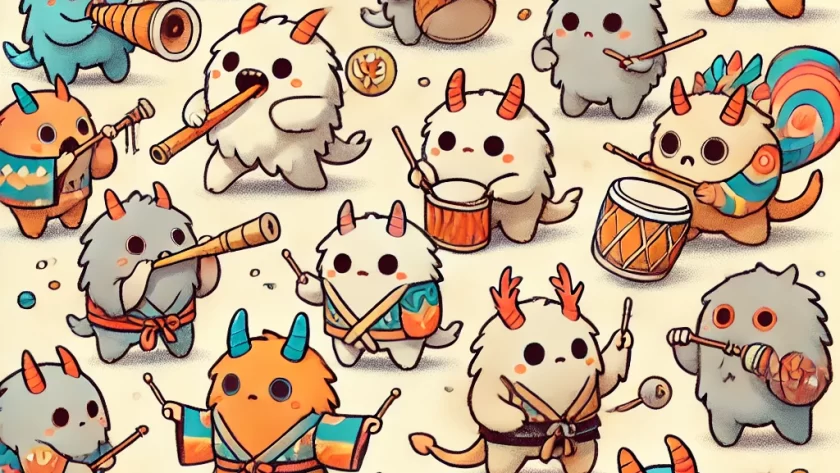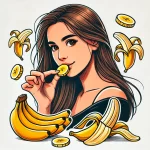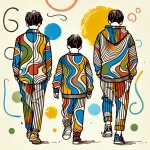おどるポンポコリン [Odoru Ponpokorin]
B.B.クィーンズ [Bī Bī Kuīnzu]
Words : さくらももこ [SAKURA Momoko]
Music : 織田哲郎 [ODA Tetsurō]
“Do you know “ちびまる子ちゃん / Chibi Maruko-chan wiki“? “Chibi Maruko-chan” is a comedy manga depicting the daily life of a third-grade girl, around 9 years old, with her family and friends. Since it was adapted into an anime in 1990, it has become widely recognized and has become a super popular anime that families can watch together, like Sazae-san wiki or Doraemon wiki. The creator, Sakura Momoko, passed away in 2018, but the anime series continues to air on TV.
“Odoru Pompokorin” is the first theme song of Chibi Maruko-chan. The lyrics were written by Momoko Sakura, the creator of Chibi Maruko-chan. The music was composed by the popular composer of the 90s, Tetsuro Oda.
Today, I will seriously explain these mostly meaningless lyrics made for children.
なんでもかんでも みんな
nandemo kandemo minna
おどりをおどっているよ
odori o odotte iru yo
- 何でも [nandemo] : anything
- みんな [minna] : everything, everyone
- 踊り(おどり) [odori] : dance (noun)
- 踊る(おどる) [odoru] : dance (verve)
(translation) “Anything and everything is dancing.”
“Nandemo Kandemo” is an idiom. The part “kandemo” has no meaning, similar to “Okie-Dokie.” It’s usually used for things rather than parson, so it gives a crazy vibe as if things are starting to dance.
おなべの中から ボワっと
onabe no naka kara bo wa tto
インチキおじさん 登場
inchiki ojisan tōjō
- おなべ [onabe] : pot
- 中(なか) [naka] : inside
- インチキ [inchiki] : fake
- おじさん [ojisan] : uncle
- 登場(とうじょう) [tōjō] : appearance
(translation) “From inside the pot, a fake middle-aged man appears.”
This is the Japanese version of “Aladdin and the Magic Lamp.”
“おじさん / Ojisan” formally means uncle, but it’s also commonly used to refer to middle-aged men.
“ボワっ / Bo wa” is today’s first onomatopoeia, representing the sound of smoke or steam rising.
いつだって わすれない
itsudatte wasurenai
エジソンは えらい人
Edison wa erai hito
そんなの常識 タッタタラリラ
sonna no jōshiki tattatararira
- いつだって [itsudatte] : always
- 忘れる(わすれる) [wasureru] : forget
- エジソン [Edison] : Edison
- 偉い(えらい) [erai] : great
- 人(ひと) [hito] : person
- そんな [sonna] : such
- 常識(じょうしき) [jōshiki] : common sense
(translation) “Always remember,
Edison was a great person.
It’s common sense. Tattatararira.”
For Japanese people, Edison is the representative of famous foreigners, which I agree with. If not, it would be Picasso, Beethoven, or Nightingale. It’s common sense.
“タッタタラリラ / Tattatararira” has no meaning, but if I were to explain it properly, it represents the scat sound Japanese people use when they sing songs carelessly. It’s used to express the melody of an instrumental or forgotten lyrics.
ピーヒャラピーヒャラ パッパパラパ
pīhyarapīhyara pappaparapa
ピーヒャラピーヒャラ パッパパラパ
pīhyarapīhyara pappaparapa
“ピーヒャラ / Pīhyara” represents the sound of a Japanese flute. When expressing traditional Japanese festival scenes, the instruments are flutes and drums. The flute’s sound is “pīhyara”. Momoko Sakura chose this word to create a lively party atmosphere.
“パッパパラパ / Pappa parapa” has no meaning, but it might be representing the sound of a horn section.
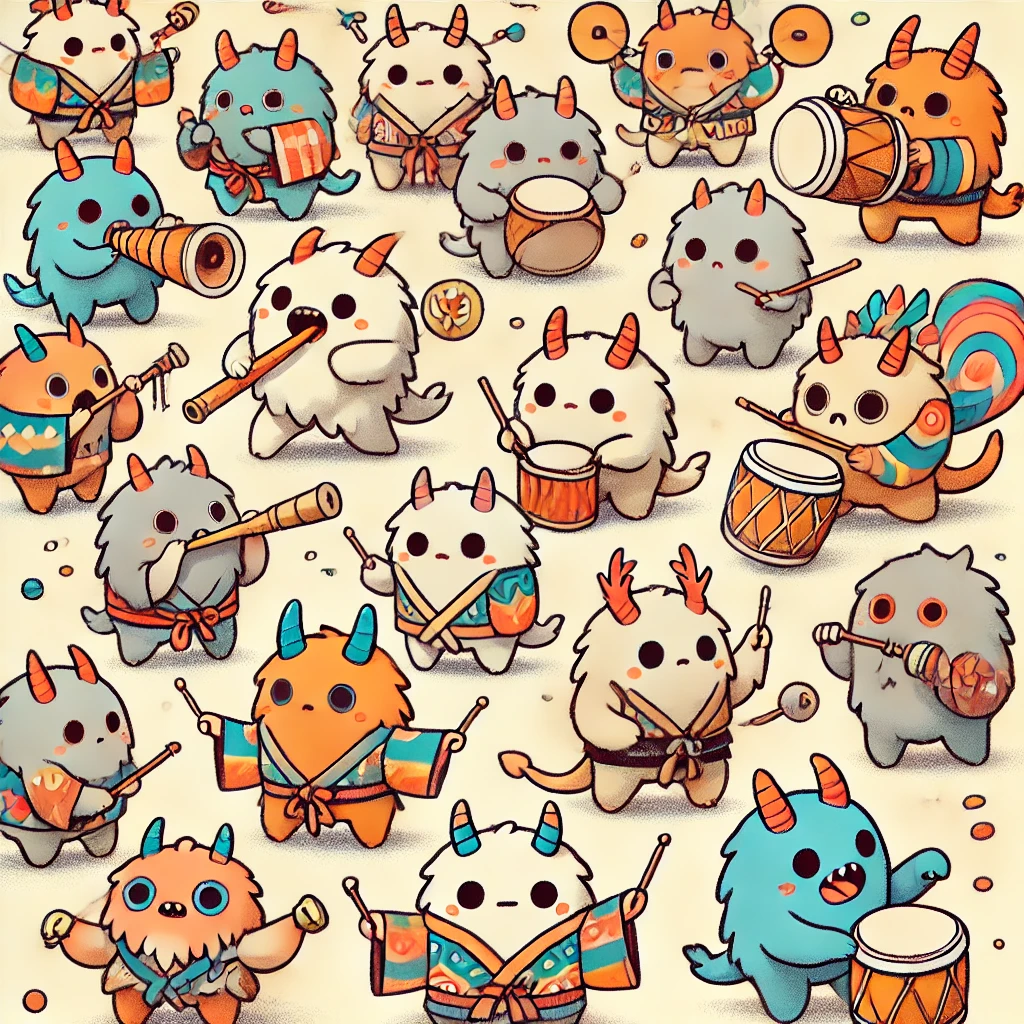
ピーヒャラピーヒャラ おへそがちらり
pīhyarapīhyara oheso ga chirari
タッタタラリラ
tattatararira
- へそ [heso] : navel
- ちらり [chirari] : glance
(translation) “With a glance of the navel
“ちらり / Chirari” is an onomatopoeia. It can be used when glancing or when something sexy, like a navel or women’s underwear, is slightly visible.
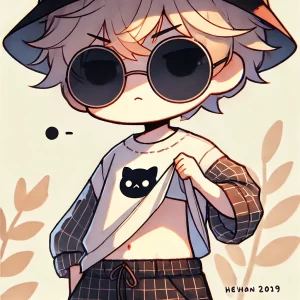
ピーヒャラピーヒャラ パッパパラパ
pīhyarapīhyara pappaparapa
ピーヒャラピーヒャラ おどるポンポコリン
pīhyarapīhyara odoru ponpokorin
(translation) “Odoru Pompokorin.”
The most meaningless word in this song is “ポンポコリン / Pompokorin.” Only Momoko Sakura could tell us what it means.
If it were ”ポンポコ / ponpoko”, it would be an onomatopoeia associated with raccoon dog, but that’s not the case this time.
There’s no basis for this, but I imagine it as a bouncy, not particularly cute, useless monster. Can you imagine something from this word?
ピーヒャラ ピー お腹がへったよ
pīhyara pī onaka ga hetta yo
- お腹(おなか) [onaka] : stomach
- 減る(へる) [heru] : hungry
(translation) “I’m hungry.”
This phrase has meaning, but the lyrics themselves have none.
あの子も この子も みんな
ano ko mo kono ko mo minna
いそいで歩いているよ
isoide aruite iru yo
でんしんばしらのかげから
denshinbashira no kage kara
お笑い芸人 登場
owarai geinin tōjō
- あの [ano] : that
- この [kono] : this
- 子(こ) [ko] : child
- みんな [minna] : everyone
- 急いで(いそいで) [isoide] : in a hurry
- 歩く(あるく) [aruku] : walk
- 電信柱(でんしんばしら) [denshinbashira] : utility pole
- 影(かげ) [kage] : shadow
- お笑い芸人(おわらいげいにん) [owarai geinin] : comedian
(translation) “Everyone, both that child and this child,
is walking in a hurry.
A comedian appears from behind the utility pole.”
いつだって 迷わない
itsudatte mayowanai
キヨスクは 駅の中
kiyosuku wa eki no naka
そんなの有名 タッタタラリラ
sonna no yūmei tattatararira
- 迷う(まよう) [mayou] : get lost
- 駅(えき) [eki] : station
- 有名(ゆうめい) [yūmei] : famous
(translation) “Never lost,
the kiosk is inside the station.
It’s famous. Tattatararira.”
“Kiosk” is a brand name for small shops operated by Japan Railways wiki inside train stations. They’re convenient. This is the only useful lyric in this song. Thank goodness.
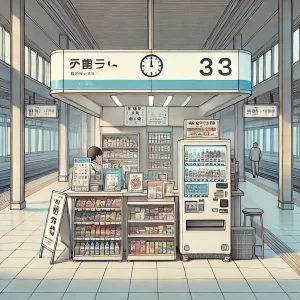
ピーヒャラピーヒャラ パッパパラパ
pīhyarapīhyara pappaparapa
ピーヒャラピーヒャラ パッパパラパ
pīhyarapīhyara pappaparapa
ピーヒャラピーヒャラ ニンジンいらない
pīhyarapīhyara ninjin iranai
タッタタラリラ
tattatararira
ピーヒャラピーヒャラ パッパパラパ
pīhyarapīhyara pappaparapa
ピーヒャラピーヒャラ おどるポンポコリン
pīhyarapīhyara odoru ponpokorin
ピーヒャラ ピー ブタのプータロー
pīhyara pī buta no pūtarō
- にんじん [ninjin] : carrot
- 要る(いる) [iru] : need
- ぶた [buta] : pig
(translation) “I don’t need carrots. “
“プータロー / Pūtaro” might be a character’s name? “Buta no Pūtaro” could be “Piggy Poo” in English. He doesn’t appear in the anime for some reason.
B.B. Queens, who sing this song, were a project group named as a parody of B.B. King. An older man who looks like Slash with a Gibson 335 guitar delivers bluesy shouts.
As mentioned earlier, Chibi Maruko-chan is an anime that families can watch together, but its theme songs are always weird and nonsensical. There is an overflow of nonsensical subculture in Japan today. I think this might be the first nonsense song for children.
If you’re interested, you might also enjoy the similarly nonsensical song “Pon Pon Pon.”
This article is the revised 2024 blog version. The video version is below.
Thanks for reading! Feel free to comment if you have any feedback or questions.
Follow me on X.
